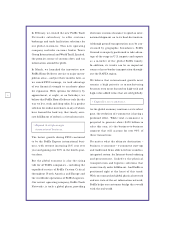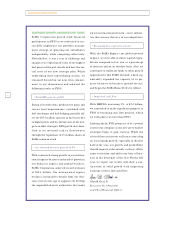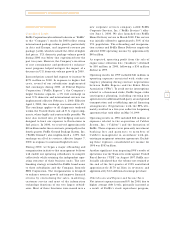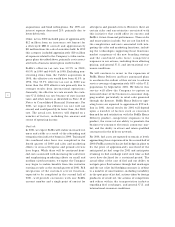Federal Express 2000 Annual Report Download - page 16
Download and view the complete annual report
Please find page 16 of the 2000 Federal Express annual report below. You can navigate through the pages in the report by either clicking on the pages listed below, or by using the keyword search tool below to find specific information within the annual report.
14
aircraft acquisitions when we determine that it
best m eets FedEx Express’s needs. FedEx Express
has been successful in obtaining investment capi-
tal, both domestic and international, for long-term
leases on terms acceptable to it although the mar-
ketplace for such capital can become restricted
depending on a variety of econom ic factors beyond
its control. See Note 5 of Notes to Consolidated
Financial Statem ents for additional information
concerning the Com pany’s debt facilities.
In July 1999, approxim ately $231 m illion of pass-
through certificates were issued to finance or refi-
nance the debt portion of leveraged operating leases
related to four A300 aircraft, which were delivered
in 2000. In June 1998, approximately $833 m illion
of pass-through certificates were issued to finance
or refinance the debt portion of FedEx Express’s
leveraged operating leases related to eight A300 and
five MD11 aircraft, which were delivered in 2000.
The pass-through certificates are not direct obliga-
tions of, or guaranteed by, the Com pany or FedEx
Express, but amounts payable by FedEx Express
under the leveraged operating leases are sufficient
to pay the principal of and interest on the certifi-
cates. In June 2000, FedEx Express filed a shelf reg-
istration with the SEC, indicating that it may issue
up to $450 million in pass-through certificates in
one or m ore offerings to finance or refinance lever-
aged operating aircraft leases.
We believe that the capital resources available to us
provide flexibility to access the most efficient m ar-
kets for financing its capital acquisitions, includ-
ing aircraft, and are adequate for FedEx’s future
capital needs.
Market Risk Sensitive Instruments and Positions
FedEx currently has market risk sensitive instru-
m ents related to interest rates; however, there is
no significant exposure to changing interest rates
on our long-term debt because the interest rates
are fixed. As disclosed in Note 5 of Notes to
Consolidated Financial Statements, FedEx has out-
standing unsecured long-term debt exclusive
of capital leases of $1.1 billion and $1.2 billion at
May 31, 2000 and 1999, respectively. Market risk
for fixed-rate long-term debt is estim ated as the
potential decrease in fair value resulting from a
hypothetical 10% increase in interest rates and
am ounts to approximately $54 m illion as of May 31,
2000 ($45 m illion as of May 31, 1999). The under-
lying fair values of our long-term debt were
estimated based on quoted market prices or on the
current rates offered for debt with similar terms
and maturities. FedEx does not use derivative
financial instrum ents to manage interest rate risk.
FedEx’s earnings are affected by fluctuations in the
value of the U.S. dollar, as compared with foreign
currencies, as a result of transactions in foreign
m arkets. At May 31, 2000, the result of a uniform
10% strengthening in the value of the dollar rela-
tive to the currencies in which the Com pany’s
transactions are denom inated would result in a
decrease in operating income of approximately
$52 m illion for the year ending May 31, 2001 (the
com parable amount in the prior year was $25 mil-
lion). This calculation assum es that each exchange
rate would change in the same direction relative to
the U.S. dollar. In addition to the direct effects of
changes in exchange rates, which are a changed
dollar value of the resulting reported operating
results, changes in exchange rates also affect the
volum e of sales or the foreign currency sales price as
com petitors’ services become more or less attrac-
tive. FedEx’s sensitivity analysis of the effects of
changes in foreign currency exchange rates does not
factor in a potential change in sales levels or local
currency prices.
FedEx has entered into jet fuel hedging contracts
on behalf of its subsidiary FedEx Express, which
are designed to lim it its exposure to fluctuations in
jet fuel prices. Under these contracts, FedEx m akes
(or receives) payments based on the difference
between a fixed price and the market price of jet
fuel, as determ ined by an index of spot m arket
prices representing various geographic regions.
The difference is recorded as an increase or
decrease in fuel expense. Market risk for jet fuel is
estimated as the potential decrease in earnings
resulting from a hypothetical 10% increase in jet
fuel prices applied to projected 2001 usage and
am ounts to approximately $49 m illion, net of
hedging settlem ents, as of May 31, 2000. There
were no such jet fuel hedging contracts at
May 31, 1999. As of May 31, 2000, jet fuel hedging
contracts cover approximately one-third of the
estimated usage in 2001. See Notes 2 and 14 of
N otes to Consolidated Financial Statem ents for
accounting policy and additional inform ation
regarding jet fuel hedging contracts.
FedEx does not purchase or hold any derivative
financial instrum ents for trading purposes.
























